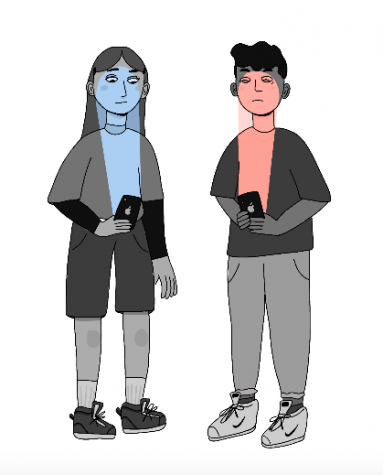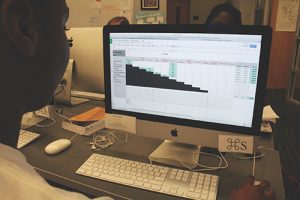Plugged in, checked out

“Hey, [how are you]?”
“Fine.”
“Are you okay?”
“Yes.”
“Ok.”
The next message JJ Penn, junior, received was a breakup text, sent with a few clicks on a screen in the middle of the night. They almost never talked in person and Penn said conversations always seemed deeper with her over text anyway.
Penn spends eight hours per day messaging people online — friends from school along with people from different states and countries, who he will probably never meet in person. He loves the constant communication technology provides, but said people act differently online than in person.
“My friends and I text over Snapchat [and] DM on Instagram, but when we hang out [we] just don’t talk,” Penn said. “They [are] way different [people] on their phone than they are in real life. It seems like the only way they know how to completely communicate is through their phone.”
Christopher Plants, sophomore member of the German American Partnership Program (GAPP), said digital communication is better than nothing. When GAPP started, the only way exchange partners could communicate was by letter. Plants said technology has given him a faster way to get to know his partner before they meet in person.
“I like technology,” Plants said. “I think it definitely connects us more with people who we otherwise could not connect to because of the distance.”
According to Sherry Turkle, Massachusetts Institute of Technology social psychologist, technology can be isolating because having a large amount of followers on social media can make it feel like we have enough friendships, so we don’t have to work for deeper connections in real life. She said technology can also be a convenient escape when a situation gets too difficult.
This artificiality is one reason why Devinn March, sophomore, said she doesn’t use social media. What started as her parents’ rule has become a habit, March has never had an account on any social media platform. She said she chooses to avoid social media because it forces users to compare themselves to others and isn’t a true representation of who people are.
“When people are on social media, they can be somebody else,” March said. “They’re hiding behind a screen. This generation has trouble getting out and talking to people, because they’re always hiding behind their phones.”
Dr. Molly Stephenson, KHS English teacher, said this lack in communication skills is why she has a no-phone policy in her classroom. She said this is difficult because students are so attached to their phones that they can’t imagine not using them during class. Stephenson said although she likes the opportunities new technology brings, addiction to the screens can harm students’ social skills needed for interviews and meetings later in life.
“I’ve seen a reduction in the ability of students to have a meaningful conversation,” Stephenson said. “Students are getting more and more uncomfortable with face-to-face communication. I force it because they need to practice it.”
Using technology during face-to-face conversations can also be harmful, according to Dr. Radhika Smith, assistant professor of colorectal surgery at Barnes Jewish Hospital. She said when doctors rely heavily on technology to document patient records, it can often disrupt communication with the patient.
“[Technology] does put up barriers,” Smith said. “When you’re trying to type a note and you’re focused on documenting, you often lose that [patient’s attention]. Sometimes you need to pause, slow down [and] make sure you’re connecting with that person on a human level.”
Smith also said technology makes it difficult to dissociate from her job at home, which she said is healthy and important for doctors. She said constantly being connected to work helps her take better care of her patients, but also takes away from her relationships. Smith said this can be true for every occupation or organization, including high school clubs and sports. Many of these at KHS send information through cell phone apps that members are required to use, such as Team App, Group Me and Remind.
“We just need to [use technology] less, but it’s not possible,” Smith said. “Our lives are so inexplicably linked to our phones and our jobs. There is no way you can get away from it.”
Your donation will support the student journalists of Kirkwood High School. Your contribution will allow us to purchase equipment and cover our annual website hosting costs.

she/her
Hobbies and Interests: reading, running, going to concerts, high jump
Favorite Song: Light my Love by Greta Van fleet
Favorite Quote: "It...

Interests: I love art and spending time with my nieces and nephews!
Favorite musical artist: Conan Gray.
Favorite quote: "You have the moral backbone...
















